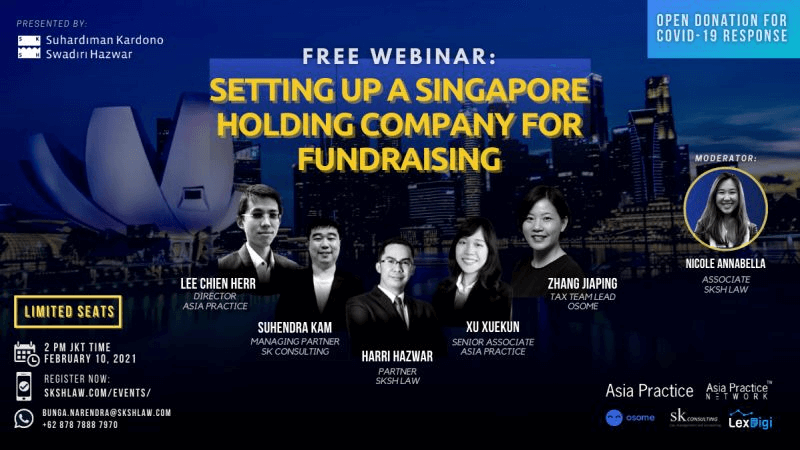How To Set Up a Singapore Holding Company From Indonesia for Fundraising
One of the most common fundraising strategies for startups, especially in Indonesia, is to set up a Singapore holding company. But how exactly do you set up a holding company abroad?

One of the most common fundraising strategies for startups, especially in Indonesia, is to set up a Singapore company. But how exactly do you set up a holding company abroad? Is it going to benefit your business? And how do you pay taxes in both Indonesia and Singapore if you’re managing a cross-border business? All this and more was discussed in a webinar that engaged tax and legal professionals from Singapore and Indonesia.

Hosted by Nicole Annabella of SKSH Law, the webinar involved:
- Harri Hazwar, Partner at SKSH Law - an Indonesian law firm offering a full range of services which cover, among others, startups and venture capital;
- Lee Chien Herr and Xu Xuekun, Director and Senior Associate at Asia Practice - a corporate and finance focused Singapore-based law practice. SKSA and Asia Practice are members of the Asia Practice Network - a network of Southeast Asian law firms which enables its members to assist their clients and investments within Southeast asia and even the Asia Pacific region;
- Suhendra Kam, Managing Partner at SK Consulting - an Indonesian accounting and management firm providing a range of services from accounting tech services to advisory;
- Zhang Jiaping, Tax Team Lead at Osome - a Singapore-based AI-powered startup that provides a wide range of services for businesses ranging from corporate secretary to taxation to HR and payroll.
The webinar was organised with the support of LexDigi - a SaaS-based legal document management and due diligence platform powered by cloud and AI technology.
How Indonesian Startups Can Leverage VC Opportunities with a Singapore Holding Company
Harri Hazwar of SKSH Law gave a presentation on Indonesian law perspective of setting up a Singapore holding company. He covered common issues such as why and when startups should establish a holding company in Singapore, how to inject the fund into the Indonesian entity, and how to extract profits from it.
Set up a Limited Liability Company in Indonesia
First of all, if a person aims to establish a startup in Indonesia, the common thing to do is to set up a limited liability company. In Indonesia, this type of entity is called “PT”. Currently, you can establish a limited liability company if you have at least two shareholders. However, upcoming legislation updates will allow to register a firm with just one shareholder. PT is also the only type of entity in Indonesia that’s allowed to have foreign shareholding.
Establish a Holding Company in Singapore when Company Grows
So when such a startup grows and aims to do a round of fundraising, its founder should consider establishing a holding company in Singapore. This can be done either before or after registering a PT. The important thing here is monitoring costs, for setting up and maintaining the holding company requires some expenses.
Setting up a holding in Singapore can benefit the startup for a number of reasons, such as easy access to capital.
As we all know, Singapore has been a finance hub for Southeast Asia, and more and more international VCs have set up their offices in Singapore. Moreover, Singapore legislation gives more flexibility in terms of share issuance, M&As, and negotiating shareholding agreements, which is important for exit planning. Besides, legal enforcement in Singapore is simply more reliable.

When a startup receives funding in Singapore and intends to inject them into PT, there are two ways for doing this:
- The startup founder may subscribe to shares issued by the Indonesian entity. However, there are national requirements for the amount of foreign capital investments and shareholding restrictions.
“Not all business lines are open to 100% foreign shareholdings, but the Indonesian government is currently trying to liberalise more business lines”, says Harri.
- Organize an intercompany loan between the Singapore holding company and Indonesian PT. Once the holding receives funding, it may issue an external inter-company loan to PT for their working capital purposes.
After doing so, a startup has to extract the profits from PT.
Similarly, there are several ways of doing this, each with its own tax aspects:
- Dividend distributions. In Indonesia, they are taxable.
- Loan repayment. Under Indonesian law, interest is taxable, though the principle itself is not.
- IP licensing. Here startups should keep in mind that royalties are subject to tax. Same might apply to payment for services for foreign companies.
What Taxes Your Company May Have to Pay in Indonesia
Suhendra Kam of SK Consulting gave a brief overview of Indonesian taxation requirements and the Indonesia-Singapore tax treaty.
The two main taxes in Indonesia are VAT (10%) and income tax, which is paid based on what a company has earned.
“Let’s say, income tax is giving us good news, because it’s going to decrease”, says Suhendra, “Now the effective income tax is 22%, and in 2022 it’s going to be 20%”.
Income Tax
Obviously, establishing a startup would require some transactions between its shareholders, or between a PT and a Singapore holding. This implies income taxes, and for the funding itself, the company has to pay a servicing fee. For that, the Indonesian company would have to withhold tax: if it has income or pays someone else, it will need to pay 2% of the transaction amount to the government by withholding the tax from the income receiver.
Taxes related to dividend and interest are a bit more complicated: neither is subject to VAT, though income tax has to be paid for interest.
Withholding Tax
In addition, if you’ve established a firm in Singapore and it owns any property in Indonesia or
has a charge of management service or hosts any activities in Singapore which involves charging back to Indonesia, all of this might involve withholding tax.
This also applies for inter-company transactions and royalties (even if they’ve been registered in Singapore). The same principle is used for expenses related to hiring foreign professionals. Many professionals reside in Singapore, and if a holding company sends them to Indonesia for business tasks, their income, too, is subject to withholding tax.
Double Taxation
Governments of both Singapore and Indonesia, however, are working to make taxation easier for cross-border businesses. Their tax treaty is aimed at eliminating double taxation by introducing the term “permanent establishment”.
In particular, it defines where a company or individual has to pay taxes. If a business or person engaged in commercial activity stays more than 183 days / 6 months in either of these countries, then they become this country’s taxpayers. However, both companies and individuals should note that for services, this period is 90 days per year, and if a company has a branch in Indonesia, then it will be charged 15% profit tax.
Transfer Pricing
Another thing an Indonesia-based company should consider is the transfer pricing issue. In short, the Indonesian government aims to stop companies from shifting their profits to other countries with lower tax rates. For business, it means that it has to provide information on whether its transaction amounts are fair enough in its tax filing.
The documents containing this data are called transfer planning documentation, which consists of 3 big parts:
- The master file that contains an overview of a company, its group, nature of business, customers and competitors;
- The local file that analyzes its transactions with affiliates. In this file, a company has to analyze whether its transactions are fair enough compared to the market transaction.
- The country by country report. This applies only for big companies or parent entities with revenue exceeding 11 trillion rupees per year.
Fortunately, this documentation is only required for large companies such as those whose revenue exceeds 50 billion rupees per year.
Setting up a Singapore Holding Company and Formalizing an Investment
Xu Xuekun of Asia Practice talked about the basics of setting up an investment holding company in Singapore and formalizing an inbound investment.
Among the many types of corporate bodies, the most popular one is a limited liability company. It provides the most flexibility as a business entity. Its members have limited liabilities that are limited to what they put into the company's investment, which implies a lot of insulation between the company itself and its members, and then between the holding company and any of its subsidiaries. In terms of the domicile of the assets, that can be helped by a Singapore holding company.
If a holding company is based in Singapore, its subsidiaries can be located anywhere in the world. Furthermore, the corporate tax in Singapore is a flat 17%, and dividends are exempted from taxation. On top of that, the Singapore government provides various funding subsidies and grants in order to support local businesses and innovation.
The Process of Incorporating A Company in Singapore
Xu Xuekun explained that the process of incorporating a company in Singapore can be finalised in a couple of days, and the cost for just the incorporation alone could be as low as 350 SGD. The company should appoint a board of directors who’ll be in charge of all day-to-day company management, whereas the powers of the shareholders will be limited to participation in fundamental matters, and affecting the shareholders’ own rights.
In addition, every local company has to have a director and secretary resident in Singapore, which leads many companies to hiring a nominee director or secretary. In terms of the documents required, the bare minimum is a constitution and the certificate of incorporation.
Another requisite of company registration is issuing of shares. In Singapore, the default class of shares is ordinary shares, and all ordinary shareholders have voting rights unless a company creates new classes of shares whose voting rights are different. This allows for significant flexibility in investor-shareholder relations. A company should remember, though, that creation of new shares has to be reflected in the company’s constitution, shareholders’ agreement and resolution.
Besides, when a company looks for investors in Singapore, it is important to know that the issue of new shares in the course of a funding round usually dilutes the shareholding percentages of existing shareholders. If a company wants to maintain its pre-investment shareholding structure or take advantage of different share classes, it has to be negotiated in advance.
Licensing
Lastly, Xu Xuekun covered the licensing issue. If a company you establish in Singapore aims to be engaged in fund management or similar activities, it will require an appropriate licence issued by the monetary authority of Singapore.
The list of requirements for any such licence is quite extensive, she says, “Which is why we always recommend for a potential client who is thinking about entering into the Singapore market and who may be venturing to things like fund management, to always first get a legal opinion from us lawyers with the analysis of the business structure for the new venture”.

Tax Exemptions for Singapore (Investment Holding) Companies
Zhang Jiaping of Osome focused on the investment holding companies in Singapore and what taxes they are liable to.
Find out the definition of Year of Assessment
The fundamental thing Singapore-based companies need to be aware of is how local tax authorities define a year of assessment. In Singapore, year of assessment is defined on the preceding year basis, so revenue earned in, say, 2020 is taxed in 2021.
Tax Filing Process in Singapore
Tax filing process in Singapore is relatively simple and consists of two tax filing runs during the year. The first one is estimated chargeable income, which has to be filed three months after a company’s financial year ends. The second one is the final tax return, which a company has to file regardless of whether it is profitable or not.
There are some exemptions, so companies should research if they are eligible for a waiver. Once the company or external tax agent has prepared the final tax report and submitted it to the Inland Revenue Authority of Singapore (IRAS), they will issue an assessment and indicate the tax liabilities and payment due dates.
If a company wants to enjoy the generous tax exemptions that Singapore allows, it has to meet all eligibility criteria. For instance, a company must be incorporated in Singapore and be its tax resident. Some rules apply also to shareholder structure: if 90% of an SMB belongs to a company, it is no longer eligible for startup corporate tax exemption. If an SMB is eligible, though, it can enjoy tax exemptions of up to 75% during the first 3 years of assessment.
Tax Treatments on Investment Holding Companies
Singapore also practices peculiar tax treatment of investment holding companies. If a company holds an asset and receives passive income, this income is only taxable when it is remitted into Singapore or derived from Singapore, even if it’s been earned elsewhere.
“Investment holding companies should keep track of foreign dividend income, whether such dividend has been remitted into Singapore, and all the expenses which are attributable to the respective income. Unless exempted, foreign dividends received in Singapore are taxable for 17%. Such exemptions include double taxation relief - in cases where a company has already suffered withholding tax abroad,” she notes.
In case of investment holding companies, the obligation to pay taxes in Singapore depends on tax residency, which is defined by where the management control is exercised. Among other criteria, physical, general or board of directors’ meetings have to be held in Singapore.
Conclusion
Tip
For companies who plan to set up a holding company it would be good to get a comprehensive overview of what to expect in terms of registering a company, all the way to paying taxes. While founders may want to get the ball rolling in terms of business operations, all these administrative, legal and financial aspects of the company should not be overlooked. Founders can always do these on their own, or they can get help from accounting experts who are experienced in corporate tax rules in Singapore.







